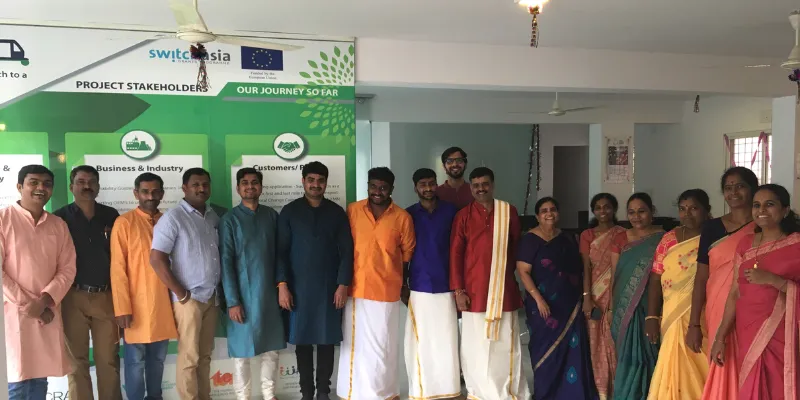Coronavirus: Amid the lockdown, Namma Auto plans to better the plight of the autorickshaw drivers
The autorickshaw drivers across Bengaluru are finding it difficult to make ends meet during the 21-day lockdown
For the last 30 years, Hussain Khan, an autorickshaw driver, has been earning his living on the roads of Bengaluru. Hussain, who lives by himself, makes about Rs 1,000 with about 10-12 rides every day; this is his only source of income.
Narasimha has a family of three and earns his money by driving an autorickshaw. However, his wife has been mentally ill for almost 30 years now, and he has been struggling to make ends meet. Not too long ago, Narasimha took a private loan to buy another rickshaw for his son, so that he could earn an additional income for his family.
On March 24, the government declared a complete lockdown in all the states for a period of 21 days, with only essential services functioning. While ride-hailing services like and are deploying their emergency services for healthcare workers, the automobiles that are deployed are mostly the regular cabs and other cars, but not autorickshaws.
This has impacted both Hussain and Narasimha, leaving one of them with no income or financial aid, and the other with a loan he cannot repay.
Namma Auto, a Bengaluru-based consortium of partners, has helped over 30,000 autorickshaws become more eco-friendly, with cleaner technologies and sustainable practices. It works with its stakeholders, in this case, the autorickshaw drivers for the shift to an economic and environment-friendly option.

Team Namma Auto
The organisation is closely knit with various aspects like training the drivers, helping them identify the right finance mechanisms, and choosing the right vehicle, among many others. In other words, Namma Auto has formed a community for the drivers and the companies in the autorickshaw sectors, in order to bridge the gap.
In a conversation with SocialStory, Manju Menon, the Project Head at Namma Auto, expresses her views on the plight of the auto drivers, and what it as an organisation plans to do to better the situation.
Daily income affected
“Even though I have a ration card, for how long can I keep buying these groceries if I do not have any income?”
This is the concern of Mohan D., an auto driver from Nandini Layout, who stays with his family of three. Mohan used to spend at least 12 hours a day with about 12-14 rides to earn about Rs 1,200 for that day. On some days, he does not even make as much.
When the lockdown was imposed, the drivers barely got any rides, maybe two or three a day. Manju explains the kind of losses that they incurred during the time.
“Usually, they get quite a few rides in a day, but the lockdown has strained the numbers. When they complete one ride, they have to ride many kilometres to find the next one, making all the travel in between dead kilometres.”
Due to this dire situation, some of the drivers even hiked the prices to almost three times, which became difficult for the essential service workers as well.
“On most days, the meter would come up to Rs 120 all the way to work,” says Sundari, who works in a bank, which is also considered an essential service. “Just when the lockdown was about to start, they charged me Rs 250 just for one way.”
Not only the drivers, but customers too, were impacted by the lockdown, for whom rickshaws are their daily mode of transport.
Loan repayments – standstill
Namma Auto also helps rickshaw drivers by facilitating loans and helping them keep a tab on these loans. However, at present, they are facing a crisis due to the lockdown and are unable to repay their loans.
“Most of them are facing issues in repaying their personal loans and cooperative loans,” says Manju, adding, “And when we spoke to the cooperative, they are unable to cater to the number of requests that are coming in for the same.”
While the Reserve Bank of India (RBI) has granted a moratorium of two months for loan repayments in March, in case of receiving no income, drivers who have taken private loans might suffer the brunt of the situation.
Narasimha, who took a loan from a loan shark to purchase another rickshaw, says, “The principal amount is close to Rs 20,000, and I repay about Rs 2,000 every month. But, how can I do that now without any income?”
Groceries, food supplies
Thanks to the BPL ration card, the families of these rickshaw drivers get enough food for some time. Since grocery stores are open, they are able to break even for a while. Many NGOs, despite the severity of the situation, are providing food packets and rations to the poor in many parts of India that would suffice for at least a month.
“I get about 28 kg of rice and about four kg of wheat with the BPL ration card,” says Narasimha.
Namma Auto during COVID-19
Manju says that the 21-day lockdown has led to some very severe concerns, however, currently, it has become difficult to provide any monetary help to the drivers with direct cash, as such a situation wasn’t anticipated. Although, it does plan to deploy hygienic practices in these vehicles.
“We are trying to get our drivers opportunities for emergency rides in the city,” says Manju. “But we also realise that we cannot have all of our drivers come out, as it may not be cost-efficient. Nevertheless, we are trying to get the drivers who are interested to do the same.”
The organisation is trying to find volunteers to deliver essentials in the days to come.
One of the problems, post the lockdown, will be the sheer number of people stepping out of their houses. That calls for a lot of havoc. So, in order to safeguard the drivers, Namma Auto plans to provide hygiene kits to these drivers in the days to come.
“We are planning to train them on the importance of hygienic practices,” says Manju, adding, “We will be training them how to sanitise their vehicle after every ride, so that the chances of them procuring the infection is reduced.”
(Edited by Suman Singh)
Edited by Suman Singh







![[App Fridays] TikTok lovers, are you ready for Firework, the new short video platform in town?](https://images.yourstory.com/cs/2/a182c7e0140711e987e2f7248b252f46/Firework1571401406063png?mode=crop&crop=faces&ar=1%3A1&format=auto&w=1920&q=75)
![[Funding alert] AgroStar raises $70M Series D investment, will invest in tech and expansion](https://images.yourstory.com/cs/2/a9efa9c02dd911e9adc52d913c55075e/AgroStar-1638858370952.jpg?mode=crop&crop=faces&ar=1%3A1&format=auto&w=1920&q=75)